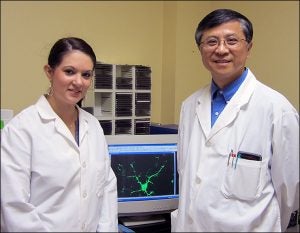‘POWERFUL TOOL’
Cell research could lead to advances against Alzheimer's, cancer

Doctoral student Amy Friesland, left, and Dr. Qun Lu are co-first authors on a recent research article that may help in the fight against Alzheimer’s and other illnesses. (Contributed photo)
Research by a team at East Carolina University could help lead to a better understanding of how individual cells perform certain tasks and could have implications for Alzheimer’s disease, cardiovascular disease, cancer and other conditions.
Dr. Qun Lu, a professor of anatomy and cell biology at the Brody School of Medicine at ECU, said his team’s discovery of a chemical compound involved in cell signaling and a potential small molecule drug lead that could affect the action of Cdc42 subclass of small G-proteins “provides a potentially powerful tool for research … in human pathogenesis.”
Lu’s research is published in the current issue of The Proceedings of the National Academy of Sciences of the United States of America. An abstract of the study, titled “Small Molecule Targeting Cdc42-Intersectin Interaction Disrupts Golgi Organization and Suppresses Cell Motility,” is available online at http://www.ncbi.nlm.nih.gov/pubmed/23284167.
Lu’s study reports the novel small molecules that target Rho family small signaling guanine nucleotide-binding proteins, known as GTPases. The study focuses on the use of computer-assisted virtual screening to discover the first of such small molecules that targets the Cdc42 subclass of proteins and its activator, intersectin, and disrupts Cdc42-mediated cellular processes.
Signaling through the Rho GTPase pathway allows cells to accomplish a number of tasks including membrane trafficking, cell cycle control and the regulation of cytoskeletal organization, which strongly influences cell morphology and motility as well as the ultimate fate of the cell. Many human pathological conditions including cancer and neurological disorders involve Rho GTPase dysfunction or de-regulation, making small G-proteins prime candidates for pharmaceutical intervention.
ECU doctoral student Amy Friesland is a co-first author of this article. Lu collaborated with the laboratories of Dr. Yan-Hua Chen in the ECU Department of Anatomy and Cell Biology of Brody School of Medicine as well as with scientists in China. The study is funded in part by grants of nearly $1.2 million from the National Cancer Institute and by the Harriet and John Wooten Laboratory for Alzheimer’s and Neurodegenerative Diseases Research at ECU.